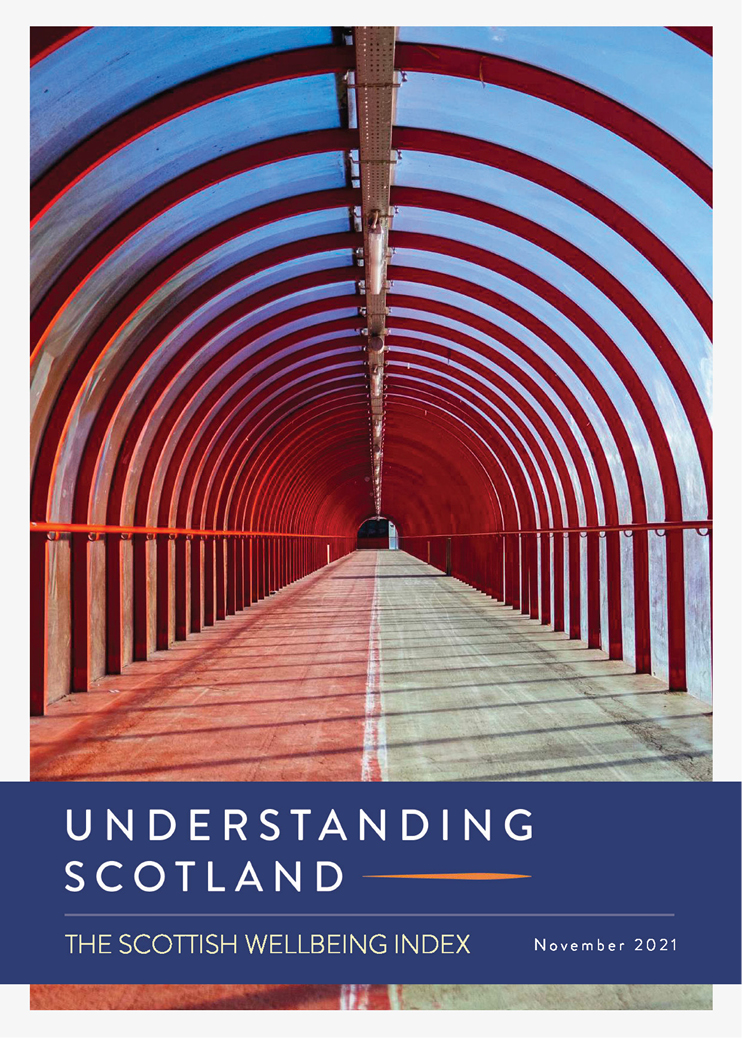We are delighted to present this inaugural edition of the Scottish Wellbeing Index report. Part of the new Understanding Scotland survey, this report is just one of a series of recent and forthcoming publications, taking the pulse of Scotland with regards to society, the economy and the environment.
The Index will measure and monitor subjective wellbeing in Scotland at regular intervals, both gauging our direction of travel, and bolstering our understanding of wellbeing and its various facets and determinants through its bank of valuable data.
In this edition we introduce our new index of Scottish wellbeing, and explore the factors that shape and influence how content we feel in our lives and in ourselves. In this report we explore how subjective wellbeing among the Scottish public varies according to demographic, geographic, professional, educational and socioeconomic characteristics.
We present two complementary measures of wellbeing: a unitary headline indicator of subjective wellbeing, and another composite measure encompassing life satisfaction and feelings of worth, happiness and anxiety. These measures, respectively, provide a valuable headline index of Scottish wellbeing, and offer the depth of detail by which to improve our understanding of wellbeing, its
different aspects and its determinants. Our polling and analysis finds that a clear majority of the Scottish population are broadly positive about their lives, but with considerable inequalities of wellbeing, both demographically and geographically, with younger respondents reporting lower wellbeing. Professional and socioeconomic factors appear to have the starkest impacts on wellbeing, with highly detrimental effects of unemployment, inactivity and deprivation recorded. These and other key findings are outlined in the summary and, in greater detail, throughout the report.
Key Takeaways
- A clear majority of the Scottish public can be said to feel broadly positive about their lives
51% of respondents can be thought of as feeling broadly positive about their lives, with a reported wellbeing score of at least 7 out of 10, compared to only 10% who are broadly negative about their lives, with a score of 3 or lower. - However, there are substantial inequalities and variations within this
there are notable differences in wellbeing between demographic groups, with older and more affluent respondents reporting above-average wellbeing, while unemployed, inactive and disadvantaged respondents see markedly lower wellbeing. - The Scottish population is broadly optimistic about their wellbeing over the next 5 years
with the exception of retirees and older respondents, all groups anticipate higher wellbeing in 5 years’ time. This is especially pronounced among students and young people. - With age comes improved wellbeing, though perhaps not forever
older and retired individuals report the highest average levels of wellbeing – both overall and on individual aspects thereof – but are unique in expecting this to fall in the coming years. - Socioeconomic disparities are reflected starkly in subjective wellbeing
wellbeing is, on average, 1.25 Points or 23% higher in the most prosperous fifth of neighbourhoods than in the most deprived 20%. Respondents in the most deprived areas also deemed their lives 20% less worthwhile than their most affluent counterparts, and were over five times as likely to be ‘not at all satisfied’ with their lives. - Unemployment & inactivity have significant detrimental impacts on wellbeing
Employment status saw the starkest differences in wellbeing. Among the unemployed and the inactive/unable to work, respectively, average wellbeing is 26% and 31% below the national average. - The Scottish population feel largely satisfied, wortwhile and happy, but anxiety is high
on specific aspects of wellbeing the findings are broadly positive: 55% and 58% respectively deem their lives satisfying and worthwhile. Over half (55%) had felt happy the previous day, but a third (32%) reported feeling anxious. - Employment is closely related to feelings of worth
forms of employment have an evident impact on people’s sense of purpose, with the unemployed and those unable to work markedly less likely to feel things in their life are worthwhile, while the self-employed are most likely to do so. - Female and younger respondents report higher anxiety
while sex had only minor impacts on life satisfaction, worth and happiness, 2 in 5 female respondents (37%) reported feeling anxious the previous day compared to only 26% of men. Younger respondents were also markedly more anxious than their older counterparts. - Students fare better in all aspects of wellbeing than young people in general
While still below the national average, students report higher life satisfaction and happiness, and lower anxiety, than young people more broadly. Furthermore, they report above-average feelings of worth, leading their younger counterparts by 12% in this regard.
